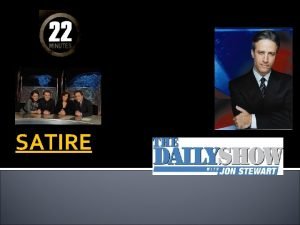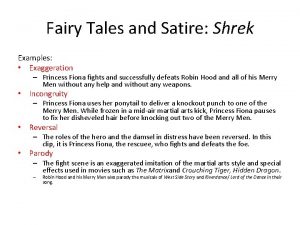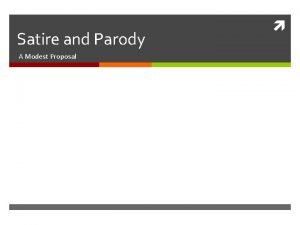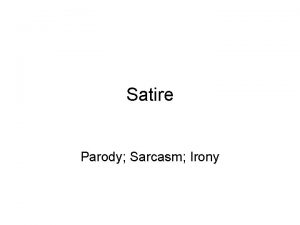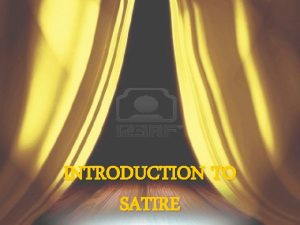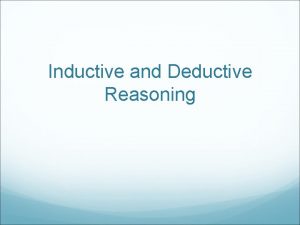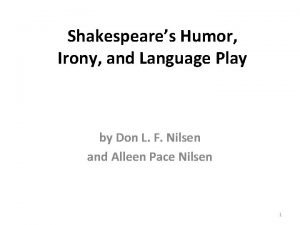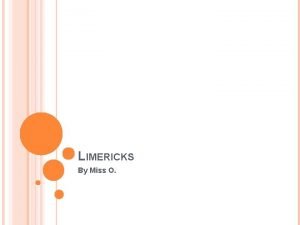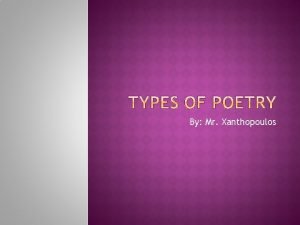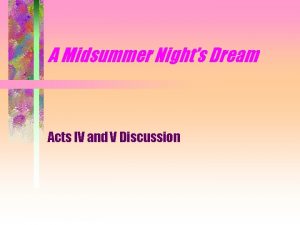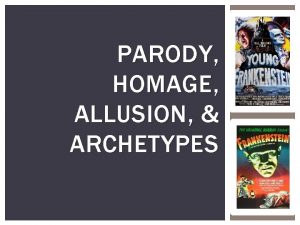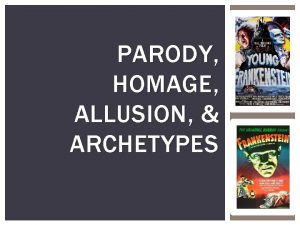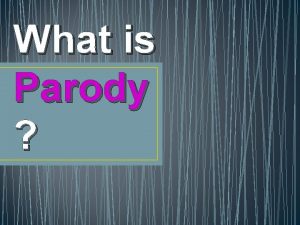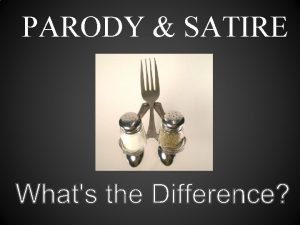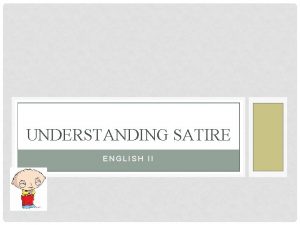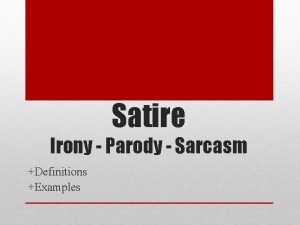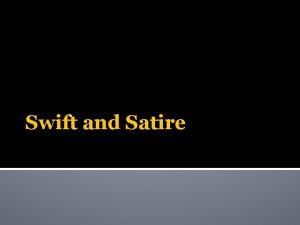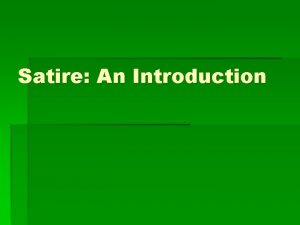Understanding Satire Parody and Humorous Arguments Dyings easy














- Slides: 14

Understanding Satire, Parody, and Humorous Arguments “Dying’s easy, but comedy will kill you. ” --Sir Laurence Olivier

First, the Big Picture…Four “Shapes” of Literature Tragedy: shape of Disintegration – Main character breaks from society, family, country, etc. – Government, society, family breaking down Comedy: shape of Reintegration – Restoring family or social order – Things start out jumbled but sort out

Four “Shapes” of Literature Romance: shape of Wish-fulfillment – Adventure full of excitement and passion – Main character desires something • (eventually) gets it Satire: shape of Fragmentation – Chaos, uncivilized – Social fabric threatens to come apart

What is Satire? Humorous, wry, detached Ridicules politics, society, human foibles Makes us examine life & change it Moral outrage is at core, then either: – Condemns – Warns/Heals

TYPES OF SATIRE FORMAL/DIRECT – Directly addresses audience or reader; openly criticizes topic – Classified as “Horatian” or “Juvenalian” INDIRECT – Relies on ridiculous behavior of characters

TYPES OF FORMAL SATIRE HORATIAN Ridicules gently Often laugh-out-loud funny “Satirical physician” JUVENALIAN Derides subjects harshly and bitterly Abrasive “Satirical executioner”

Parody Humorous imitation of another work – Generally, original work is serious – Humorously imitates style, key ideas, form – Often tackles “inappropriate” subjects Typically light-hearted or good-natured May also mock shared/universal experience

Differences Between Satire & Parody Satire invents fictitious situation – Purpose: ridicule people, events, or ideas – May include existing elements/real details Parody imitates or mocks existing work – Purpose: Points out flaws of the original work – Absurdly exaggerates its characteristics

Keys to Writing Humorous Arguments Humorous Techniques/Devices Timing Details Incongruity

Humorous Techniques/Devices Irony – Verbal (sarcasm, understatement, exaggeration) – Situational (unexpected) Hyperbole (exaggeration) Understatement or meiosis – Litotes (uses opposite: not a bad singer, not unhappy) Jargon – Using expressions from particular group or field

Timing Use current events or topics – Audiences need to understand references Build suspense, then drop punchline

Details “And before you accuse me of being some kind of sherry-sipping ascot-wearing balletattending Mac. Neil-Lehrer-News. Hourwatching wussy, please note that I am a sports guy myself, having had a legendary atheletic career consisting of nearly a third of the 1965 season on the track team at Pleasantville High School (“Where the Leaders of Tomorrow Are Leaving Wads of Gum on the Auditorium Seats of Today”). -- Dave Barry

Details Precise details add to humor Consider the difference: “And before you accuse me of being some kind of wussy, please note that I am a sports guy myself, having had an athletic career on the track team at Pleasantville High School. ”

Incongruity Juxtaposing diction – Colloquial expressions for lofty figures or situations – Overly formal language Combine pop culture with “higher” subjects – Real current events or literary references Consider bizarre “What ifs”
 Humorous imitation
Humorous imitation Sarcasm in shrek
Sarcasm in shrek Parody v satire
Parody v satire Perversity
Perversity Shrek satire examples
Shrek satire examples Understand quran and salah the easy way
Understand quran and salah the easy way Inductive reasoning vs deductive reasoning geometry
Inductive reasoning vs deductive reasoning geometry Inductive reasoning vs deductive reasoning geometry
Inductive reasoning vs deductive reasoning geometry Example of a deductive argument
Example of a deductive argument Comedy vs tragedy shakespeare
Comedy vs tragedy shakespeare Literary devices in romeo and juliet
Literary devices in romeo and juliet Words that rhyme with humor
Words that rhyme with humor Humorous five line poem
Humorous five line poem What is hippolyta’s reaction to the play
What is hippolyta’s reaction to the play Limericks example
Limericks example
